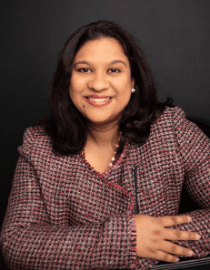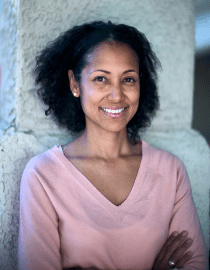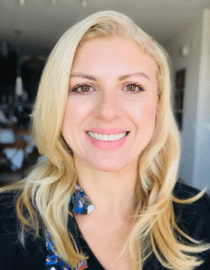By Andrew Cohen
Video game lawyer Anais Jansen-Fernandez moved from Venezuela to The Netherlands as a teenager, and later lived in Malaysia. Real estate and corporate lawyer Shabna Ummer-Hashim grew up in India and has since worked in Oman and Dubai. Global investments analyst Caroline Haber, raised in Brazil, launched a sustainability project in Kenya and once traveled to 15 countries in seven months.
New students in Berkeley Law’s LL.M. Program, they are emblematic of its vast legal experience, international diversity, and outside-the-box thinking.
Shabna requested using her first name in this article (rather than the standard editorial format of last name on second and subsequent references), because “it gives the female perspective — I want girls, especially from third-world countries, to have an identity of their own.” For consistency and solidarity, Anais and Caroline asked to be referenced by first name as well.
“I fell in love with the campus last summer when I was doing a college tour with my daughter, and I wanted to understand law from a different perspective,” says Shabna, senior legal counsel at Meydan Group LLC. “The LL.M. Program is great. Instead of being spoon-fed the answers, we’re made to think about the application of law and interpret it, which enhances my skills and helps me think like a lawyer.”
Shabna, Anais, and Caroline are part of the program’s executive track, which houses two degree paths: online in spring and fall and on-campus during the summer, or two consecutive summers on campus.
In addition, Berkeley Law welcomed 60 traditional and thesis track students who started in January. They too are attending classes remotely this semester, and will complete their LL.M. studies either this summer or fall.
“UC Berkeley is a world-renowned university and a leader in social justice and public interest matters,” Caroline says. “I’ve made a commitment to social justice since I was teenager and I always told myself that if I were to restart my law career, it would be here.”
Because of the COVID-19 pandemic, Anais wanted to maximize her time at home and began looking for a law program to expand her knowledge.
“I was stunned when I saw Video Game Law is part of Berkeley’s LL.M. Program,” she says. “It’s also a unique opportunity to take the program online without disrupting my work and family responsibilities. I enjoy the diverse group of people who bring their experience and background to the table.”
Unlikely road
Growing up in a small village in India, Shabna says her community’s “traditional and orthodox outlook” presented an uphill climb for girls to establish a professional path in fields such as law. “Education and economic independence were never considered a priority for girls,” she says. “For me, pursuing a law career was a means to gain independence, self-reliance, and respect.”

Shabna made a pact with her parents: pass her entrance exams, and they would allow her to study for five years without pressuring her to get married. “I am thankful to my parents who gave me their unconditional love and support to complete my education, without which it would have been impossible.”
“It was a surprise to them, and a shock for me, that I aced the exams, without any special coaching classes” Shabna says. “My college mates used to call me a ‘nerd’ as I could not join any excursions or study tours. I wasn’t given permission for any of these — I knew one wrong move would be a death knell to my education.”
Today, with a supportive spouse and two beautiful girls, Shabna is an established lawyer with more than two decades of international experience.
“To me, law isn’t just a career. Knowledge and understanding of law has been a means for me to facilitate positive change in the community.”
To help increase diversity in the legal profession, Shabna provides guidance to financially disadvantaged students who want to pursue a legal education, conducting workshops that raise awareness about financial aid, scholarship programs, and education sponsors. “My long term goal is to set up a startup which will help students from developing countries pursue higher studies efficiently and gain training contracts with right placements after their education.”
“What studying law has provided me is the confidence to stand up for my rights and to fight injustice,” she says. “I am privileged that I’m able to support people and provide a platform to those who don’t have a voice.”
Global perspective
Anais grew up with an aunt in Venezuela before moving at age 14 to The Netherlands, where her mother went to seek a better future. She then spent three years working in the U.S. and five years in Malaysia before moving back to the U.S. in 2019.

“Having lived in all these countries, I’ve learned to understand people and acknowledge that we are all different and unique, so we have to learn how to embrace the differences and try to find common ground to work together,” Anais says.
After specializing in corporate law in The Netherlands and working with international clients, she moved to the U.S., shifted to intellectual property, and began working in the video games industry. In Malaysia, she became part of the leadership team at Streamline Media Group, an independent game development and services company, working on business and corporate affairs and managing the human resources and operations team.
Now back in the U.S., Anais is tackling corporate matters, intellectual property, and litigation — while relishing her time in Berkeley Law’s LL.M. Program.
“This process has been challenging and fascinating at the same time,” she says. “The U.S. legal approach is forcing me to be more creative with legal knowledge and analysis and embrace the challenge of discovering the unknown. I also have a study buddy. We have Zoom meetings three times a week to discuss the materials and keep each other accountable and motivated.”
Anais plans to obtain the program’s Law & Technology specialization, and take the bar exam in California and Nevada. Long term, she wants to become an independent advisor and run a firm specializing in technology, entertainment, and video game law that also helps train junior lawyers and law students, finance their education, and prepare them to run their own firm.
“A lot of creativity is required to learn and keep up with the dynamic nature of the video game industry,” she says. “As in-house counsel, you’re swayed from one law field to the other depending on what the company needs, and you have to learn how to switch gears fast. I’ve found myself preparing paperwork for one project, and after putting so much effort into it, it gets killed. You have to be able to let it be and continue gracefully with your next task.”
A natural catalyst
While living in Kenya, Caroline wanted to help disadvantaged children and visited nonprofits and orphanages to learn more about their situation. Working with an organization called IVHQ, she launched the Chicken Coop Project at a 500-student school in a remote Maasai village.

“The government had stopped providing food for the school, which didn’t have water or bathrooms, and the classrooms were in precarious conditions,” Caroline recalls. “An employee asked me to provide food, and I chose to build a chicken coop and teach the children the importance of financial sustainability.”
Working with a teacher at the school, they created a committee with the teacher and nine students that included positions such as treasurer, secretary, and other roles. Starting with 50 egg-laying poultry, they ended up with 130 — igniting a wave of other volunteer projects to benefit the children.
Caroline, who has lived in the U.S. for the past 15 years, has a law degree from Brazil but decided to change careers. She earned a master’s in international studies from the University of San Francisco, and is now vice president/operational due diligence analyst for Citi Private Bank’s Global Investments team.
“I feel lucky but also rewarded being able to constantly learn from experts in the finance industry, and also masters in leadership, teamwork, and career development,” she says. “With a lot of work, I was able to grow within the firm.”
Caroline applied to Berkeley’s LL.M. Program to return to a law career, which she says has always been her true passion. While her job carries ample responsibilities, she describes herself as “the luckiest person in the world for being accepted” to the program.
“I’ve had to juggle multiple responsibilities simultaneously throughout my life, and I wish I could say things have been calm and easy-going since starting the program,” Caroline says. “That’s not the case, as I have a full-time demanding job and a personal life to manage, but that is absolutely okay. It’s definitely worth it.”